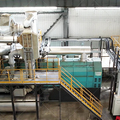The conversion of waste plastic into oil has emerged as a transformative solution to address the challenges of plastic pollution, resource scarcity, and energy security. This innovative process involves thermally decomposing plastic waste into valuable hydrocarbon-based fuels, such as diesel, gasoline, and kerosene. In this comprehensive discourse, we will explore the intricacies of waste plastic to oil machine, examining the technology behind it, its environmental implications, and its potential to reshape our approach to plastic waste management.

Understanding the Waste Plastic to Oil Conversion Process:
Pyrolysis: Waste plastic to oil conversion typically employs a process called pyrolysis, which involves heating plastic waste in the absence of oxygen to break down its molecular structure. This thermal decomposition produces a mixture of gases, liquids, and solid residues.
Catalytic Pyrolysis: In catalytic pyrolysis, a catalyst is used to enhance the pyrolysis process, improving product yields and quality. Catalysts can promote specific reactions, such as cracking long-chain hydrocarbons into shorter-chain hydrocarbons, leading to higher-value products.
Continuous Processing: Continuous pyrolysis systems allow for the continuous feeding of plastic waste into the reactor, enabling uninterrupted operation and higher throughput compared to batch processes.
Technological Innovations in Waste Plastic to Oil Conversion:
Reactor Design: Advanced reactor designs optimize heat transfer, residence time, and mixing to maximize the efficiency of the pyrolysis process. Different configurations, such as fluidized bed reactors, rotating kilns, and screw reactors, offer unique advantages in terms of scalability, energy efficiency, and product quality.
Catalyst Development: Research and development efforts focus on developing novel catalyst materials and formulations to improve the selectivity, stability, and activity of catalytic pyrolysis processes. Catalysts tailored for specific plastic types and operating conditions can enhance product yields and reduce energy consumption.
Product Upgrading: Innovative downstream processing techniques, such as fractional distillation, hydrotreating, and hydrocracking, can further refine pyrolysis oil into high-quality transportation fuels that meet regulatory standards and market requirements.
Environmental Benefits of Waste Plastic to Oil Conversion:
Plastic Waste Diversion: Converting waste plastic into oil reduces the amount of plastic ending up in landfills, oceans, and incinerators, mitigating environmental pollution and ecosystem degradation.
Resource Recovery: By harnessing the energy content of plastic waste, waste plastic to oil conversion contributes to resource conservation and energy security, displacing fossil fuels and reducing reliance on finite natural resources.
Carbon Sequestration: Pyrolysis converts carbon-rich plastic waste into stable hydrocarbon products, effectively sequestering carbon and mitigating greenhouse gas emissions associated with plastic degradation and incineration.
Economic Viability and Market Potential:
Value-Added Products: Pyrolysis oil derived from waste plastic can be refined into a range of valuable products, including transportation fuels, heating oils, and chemical feedstocks, offering diverse revenue streams and market opportunities.
Circular Economy Initiatives: Waste plastic to oil conversion aligns with circular economy principles by closing the loop on plastic waste, transforming it into valuable resources and promoting sustainable resource management practices.
Economic Incentives: Government policies, such as renewable energy mandates, carbon pricing mechanisms, and plastic waste management regulations, can create favorable market conditions and financial incentives for waste plastic to oil conversion projects.
Challenges and Considerations:
Feedstock Contamination: The presence of contaminants, such as additives, dyes, and other polymers, in waste plastic feedstock can affect the pyrolysis process and product quality, necessitating pre-treatment and sorting.
Emission Control: Pyrolysis processes may produce emissions of volatile organic compounds (VOCs), particulate matter, and other pollutants, requiring effective emission control measures to ensure environmental compliance and public health protection.
Market Dynamics: The economic viability of waste plastic to oil conversion projects depends on factors such as feedstock availability, oil prices, regulatory frameworks, and competing technologies, which can influence investment decisions and project feasibility.

Future Prospects and Opportunities:
Technology Advancements: Continued research and innovation in waste plastic to oil conversion technologies hold the potential to further improve efficiency, product quality, and environmental performance, driving market adoption and scalability.
Integration with Waste Management Systems: Waste plastic to oil conversion facilities can be integrated into existing waste management infrastructure, complementing recycling, composting, and landfill diversion efforts to achieve holistic waste management solutions.
Global Collaboration: International cooperation and knowledge sharing among governments, industry stakeholders, and research institutions can accelerate the deployment of waste plastic to oil conversion technologies and address global plastic waste challenges collaboratively.
Conclusion:
Waste plastic to oil conversion represents a promising pathway towards a more sustainable, circular, and resource-efficient future. By harnessing the latent energy of plastic waste and transforming it into valuable fuels and chemicals, this innovative approach offers tangible environmental, economic, and social benefits. As we strive to tackle the complex issue of plastic pollution and transition towards a circular economy, waste plastic to oil conversion stands out as a practical and scalable solution with the potential to make a significant impact on global waste management and energy systems. Through continued investment, innovation, and collaboration, we can unlock the full potential of waste plastic to oil conversion and pave the way towards a cleaner, greener, and more resilient world.




